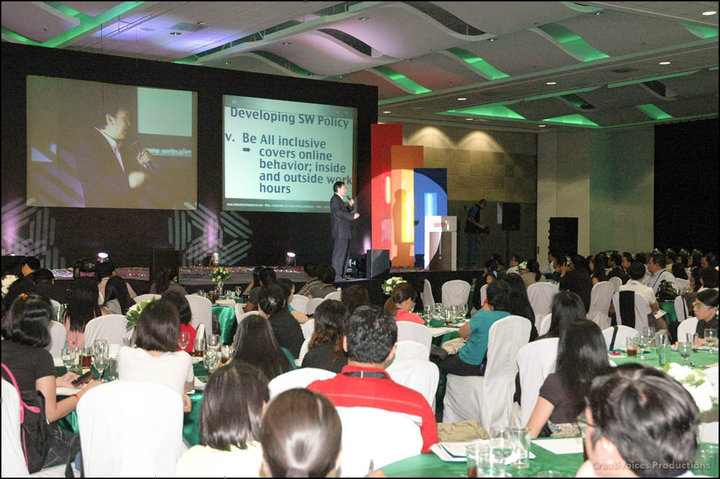
Sonnie delivering a keynote address in HR/Training Congress about the need for Social Computing Policy
About a week ago, I gave a talk to delegates of the 4th HR Philippines National Convention about HR’s Role in the Social Media era. I shared with them a framework or template that they can follow to make their company culture and structure social web-ready.
I just read a news article about Singapore Airlines’ policy against employees ranting about work and company matters in their blogs and Facebook accounts. I believe like any brand and image-conscious organization, this is the right direction.
Though there is no local survey done in the Philippines that I am aware of, the study conducted by Birkman on how HR professionals and consultants [ages 20 to 60 years old] use social media and web 2.0, may reflect the same situation locally.
The survey revealed that
- 54% of respondents are late adopters and
- another 13% are at the tail end
- Only 4 % are ahead of the curve and another
- 29% are able to adopt early on
About 83% of the respondents believe that social media can be a productivity tool but 45% of them believe employees will just use this to waste time.
What is surprising is though they knew employees can abuse the use of social media, a stunning 69% of the respondents admitted they do not have a social media policy in place.
Social media is here to stay, and we can’t control employees if they want to have blogs and keep an account on the different social networking sites, and these are enough reasons why there is a need for social media policy. Thru this social media policy, we can define what they can “talk about and share”. This should be part of your social media policy, and mind you please, even though as a company, you block access to social networking sites, the online behavior of employees can still affect the organization.
On another note, companies should define their online philosophy. An organization must revisit its mission and vision and check whether web 2.0 can be used to achieve them. This is a process that must be done before making a decision either to block access of social media in the office or embrace the use of these tools, i.e. set up their fan pages and corporate blogs. Otherwise, using social media without fully identifying the value it will bring is a time waster and a futile exercise.
Social web [social networking sites like Facebook, microblogs like Twitter, blogs like WordPress or Blogspot is a neutral but powerful tool. One can use it to add value or to intentionally destroy a brand. But a majority of users tend to use this ignorantly, thus, affecting their careers and even putting their families at risk.
Companies and any organization like schools, NGOs, churches on that matter, therefore, should [1] Define their online philosophy and [2] formulate their own social media policy.
Discover more from ASKSonnie.INFO
Subscribe to get the latest posts sent to your email.






Nice post! This is something that businesses should know especially those who consider online marketing as one of their options.